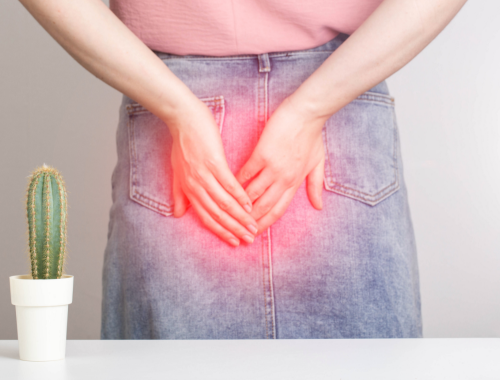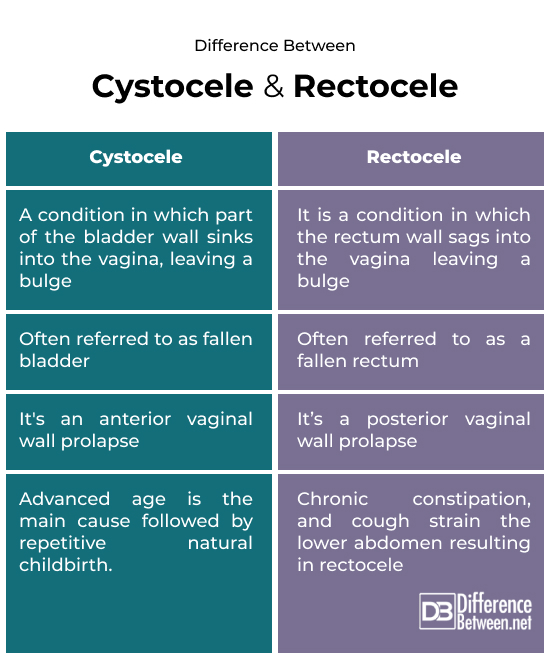Difference Between Cystocele and Rectocele
In a Cystocele, the connective tissues around the bladder and the vaginal wall get weak and stretch while a Rectocele is a condition where the supportive tissues forming the wall of the rectum and vagina weaken.

What is a Cystocele?
A cystocele is a condition in which the connective tissues around the bladder and the vaginal wall get weak and stretch due to which the bladder and vaginal wall sag into the vaginal canal.
This happens when the muscles and the connective tissues supporting the vaginal wall and holding the bladder in its place, get weakened.
The pelvic floor consists of muscles, ligaments, and connective tissues that support the bladder and other pelvic organs. The bonds between the pelvic organs and ligaments may weaken with time, as a result of trauma due to many possible reasons. When this happens, the bladder can sag down lower than the usual position and bulge into the vagina (anterior prolapse).
Causes
Possible causes of stress to the pelvic floor include:
- Pregnancy, vaginal childbirth
- Obesity, overweight females.
- Heavy weight lifting
- Straining with bowel movement
- Chronic cough or bronchitis
- Genetics
Symptoms
- The feeling of fullness or pressure in the pelvic region and vagina.
- In some cases, a bulge in the vagina can be seen or felt.
- Increased pelvic pressure while coughing or stress to the lower abdomen.
- Difficulty in urinating with frequent passing or leaking urine, also called urinary incontinence.
Treatment
- No treatment is needed if there are no symptoms
- Exercises are advised for the pelvic region.
- Physical therapy advised
- Drugs including estrogen replacement therapy.
- Surgery is performed to improve the symptoms and to repair the damage. There are many ways of surgeries including open surgery where the incision is made directly on the vagina or the abdomen, Laparoscopic surgery (done with the laser cathode), or robot-assisted laparoscopy which is a new invention.

What is a Rectocele?
Rectocele is a condition where the supportive tissues forming the wall of the rectum and vagina weaken.
Without the support of muscles and ligaments, the rectum sags and bulges into the vagina and in severe cases protrudes out of the vaginal opening.
Causes
- Chronic cough or bronchitis can also strain the pelvic floor over time, leaving more chances for rectocele
- Chronic constipation may weaken and strain the pelvic muscles
- Pregnancy and vaginal childbirth especially multiple births,
- Aging, menopause causes many changes in the body leading to decreased muscle tone in the pelvic region
- Obesity
- Heavy weight lifting
- Previous surgeries such as hysterectomy
Symptoms
- Feeling pressure or fullness in the rectum or vagina.
- A soft bulge of tissue that may or may not sag through the vagina.
- Feeling that the rectum has not completely emptied after passing stool.
- Difficulty having a bowel movement
- Having the urge to poop multiple times a day.
- Having extreme discomfort during intercourse (dyspareunia).
- Feeling loosened vagina
Treatment
Treatment of rectocele entirely depends on the:
- Removal of the causes at first such as treating cough, constipation, and maintaining a healthy weight, and then
- Performing minor surgery and inserting a pessary. A vaginal pessary is a removable device that is inserted into the vagina to support prolapsed organs followed by exercises and physical therapy to maintain the pelvic muscles tone.
Difference between cystocele and rectocele

Summary of the difference between Cystocele and Rectocele
- A condition in which part of the bladder wall sinks into the vagina is called as cystocele whereas rectocele is a condition where the rectum wall sags into the vagina leaving a bulge.
- Cystocele is often referred to as fallen bladder while rectocele is referred as a fallen rectum.
- Cystocele is an anterior vaginal wall prolapse where rectocele is a posterior vaginal wall prolapse.
- Advanced age is the main cause of cystocele followed by repetitive natural childbirth. Chronic constipation, and cough strain the lower abdomen results in rectocele.
FAQs
How can you tell the difference between a cystocele and a rectocele?
Both are medical conditions but in cystocele, the bladder wall bulges in the vagina whereas in rectocele, the rectum wall bulges in the vagina.
Can you have both a rectocele and a cystocele?
A rectocele can occur on its own or present alongside other pelvic abnormalities, such as a prolapsed bladder or cystocele.
What do rectocele and cystocele feel like?
Having pressure or fullness in the rectum even after passing stool and feeling something retained in the rectum with difficult bowel movement is indicative of rectocele. Whereas having pelvic fullness and pressure in the lower abdomen with urinary incontinence indicates cystocele.
What is the best treatment for cystocele and rectocele?
Surgery is likely the best option advised so far by placing the pessary (device) into the vagina, along with identifying and removing the causes.
What is the average age for rectocele?
The median age of rectocele is between 50-60 years usually after menopause.
What happens if a rectocele goes untreated?
Symptomatic rectoceles may lead to excessive straining with bowel movements, the urge of having multiple bowel movements throughout the day, and rectal discomfort. Fecal incontinence can occur as small pieces of stool can be retained in the anus (stool trapping)
- Difference Between Cystocele and Rectocele - September 8, 2023
- Comparison Between DHEA and DHEA Sulfate - September 1, 2023
- Difference Between Osteoporosis and Osteopenia - June 14, 2023
Search DifferenceBetween.net :
Leave a Response
References :
[0]Professional, C.C. medical (no date) Rectocele: Causes, symptoms, diagnosis, stages & treatment, Cleveland Clinic. Available at: https://my.clevelandclinic.org/health/diseases/17415-rectocele (Accessed: 11 June 2023).
[1]Mayo Foundation for Medical Education and Research. (2023, April 6). Anterior vaginal prolapse (cystocele). Mayo Clinic. https://www.mayoclinic.org/diseases-conditions/cystocele/symptoms-causes/syc-20369452
[2]Cystocele. Cystocele - Health Encyclopedia - University of Rochester Medical Center. (n.d.). https://www.urmc.rochester.edu/encyclopedia/content.aspx?contenttypeid=85&contentid=P01472
